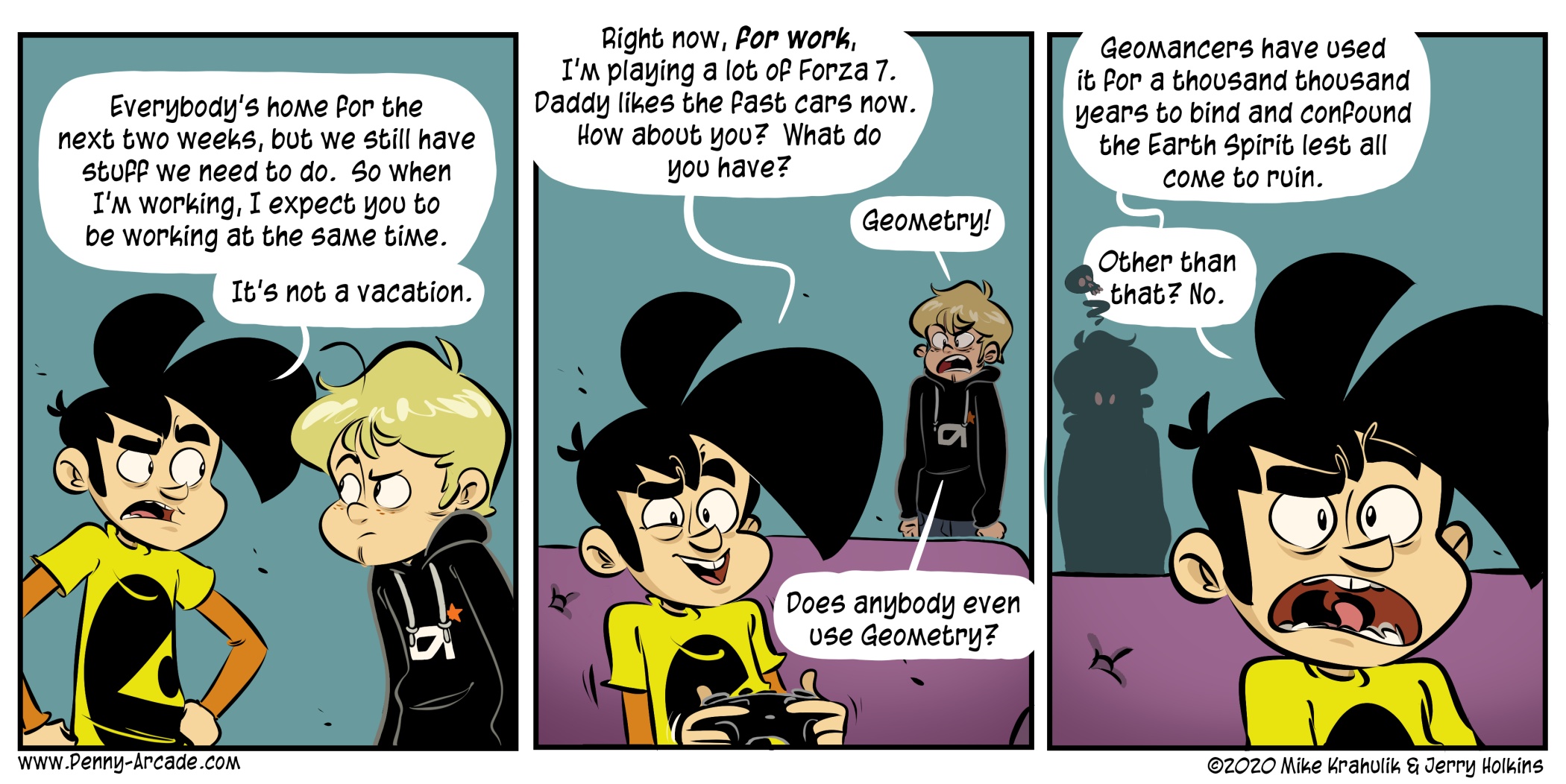Penny Arcade - Comic - Homeward
Dog Registered User, Administrator, Vanilla Staff admin
Registered User, Administrator, Vanilla Staff admin
 Registered User, Administrator, Vanilla Staff admin
Registered User, Administrator, Vanilla Staff admin
 Penny Arcade - Comic - Homeward
Penny Arcade - Comic - Homeward
Videogaming-related online strip by Mike Krahulik and Jerry Holkins. Includes news and commentary.
Unknown User on
+9
Posts
While I might agree about something like calculus, geometry (and trig) is so basic that I think you might as well teach it. Everyone from carpenters to tailors to game programmers can make use of it.
Of course, ALL kids should be taught basic life skills as well.
Everyone learns addition and subtraction. Anyone who has those and a handful of IQ points can balance a checkbook.
Do kids even have checkbooks anymore?
-Tycho Brahe
I'd add Statistics. Even just Stat 1 helps make people more savvy about random "a study says this" reports.
I've heard people talk about balancing chequebooks all my life and I still don't know what it means
I haven't been hauled up in front of the magistrates or arrested by the banking police, so my only conclusion is that it either doesn't matter all that much of is some kind of quaint American tradition like cheese on apple pie
I also haven't written a cheque in at least five years
For when you have to pay your char lady her annual stipend of one guinea, or the scullery maid requires a tanner for the boot black, or it's Bob a Job week and you're low on shrapnel but you need your Anderson shelter tidied
15, 30 and 45 degree cuts and pipe angles. Severity of a curve. Solving for the other side of an angle across a plane. It’s a solid skill set for reading plans and specs.
Maybe wrap it up in "media intelligence" and cover how to spot hoaxes, conspiracy theories and general (*sigh*) fake news.
By trig, I was referring to the very basics of geometry as it refers to triangles. Not really any advanced stuff.
It's an outdated term (like "dialing" a phone), but it really just means balancing your accounts and budgeting your expenses versus income. Know how much money you have coming in and going out so you live within your means and hopefully even build up some savings.
Well, that's disappointingly mundane, but thanks for clearing that up
I thought it was something more, I don't know, accountingy
Well, balancing accounts is kind of the bedrock of accounting, so there's that.
Edit: Wait, maybe it's that you're confusing accounting with something else. It doesn't involve capes and drinking the blood of the living, you know. Okay, maybe not the capes.
Used to be a bigger deal before stuff was deducted instantly from the account.
It's a good skill, and can be as simple or complex as you want but opposite of weight loss, you ideally have more coming in than going out.
Back in the days when I bothered to balance my checkbook, it just meant taking the monthly statement I got in the mail from the bank and comparing it to the register in my physical checkbook. Ideally, the balance on the statement should match up to what you have written in the register. I suppose part of the reason it's fallen by the wayside is that I can go online and look up my account balance anytime I want, whereas back in the early 1990s when I first got a checkbook, the monthly statement in the mail was the most official communication of your current balance. The only other source you had to keep tabs on what you had in the account was your own scribblings in the register. So, if you were bad about forgetting to write down those trips to the ATM, you could easily think you have more money than you actually have, which can lead to overdraws on the account.
It was a good habit to have if you lived paycheck-to-paycheck. Fortunately, those days are behind me, so I don't keep a very close watch on my exact balance anymore.
-Tycho Brahe
Yeah, that how it was for me too. At least, that was the ideal scenario. But when I was in college I didn't carry the checkbook with me everywhere I went, so if I took $20 out of the ATM at work it was quite easy to forget to record it by the time I got home.
-Tycho Brahe
But today, I feel young.
What did you guys use so many cheques for, purchasing mammoth steak at the grocery cave?
You know how you pay your bills online?
Imagine there wasn't an online.
I've had a debit card since about 1991
Did it have internet?
I really don't get that, when so many places that sent bills for things didn't take debit cards and didn't have any kind of automatic payment for things so you still had to send out checks so you had to pay more attention to what your balance was going to be than what the ATM reported at any given time.
But okay, whatever. This is all pretty tangential.
I will do no such thing.
And they still charged a convenience fee.